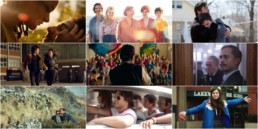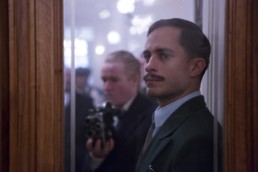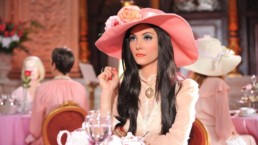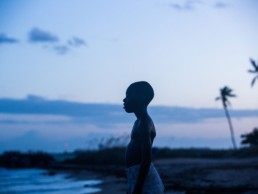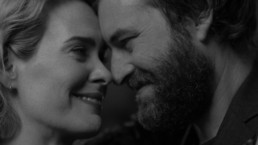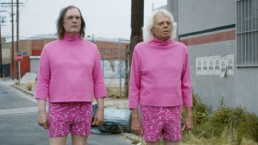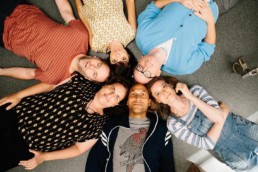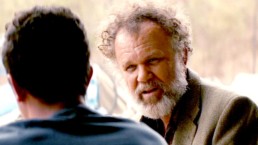Jasper's Top 10 Films of 2016
What we here at Cinemacy consider to be the best of this year represents a combination of the movies that had the greatest emotional impact on us, matched with movies that felt innovative or groundbreaking. Here are the films I consider to be this year’s best:

10. Sing Street | d. John Carney
Every so often there comes a movie that Hollywood deems the “savior” of the musical. "Moulin Rouge!" is 2001, "Chicago" in 2002, etc. While "La La Land" will reap that title in 2016 (it’s really great, of course), one mustn't forget a little move called "Sing Street," a joyous rush of 80s pop and new wave energy from director John Carney. Carney has made a name for himself over the last decade with his deep admiration for music in his films. While his debut, the cult favorite "Once" looked to find love between two small-town Irish songwriters, his next feature, the underappreciated "Begin Again," found joy in modern American pop music. "Sing Street" lands somewhere in the middle - a love letter to 80s new wave in small-town Ireland. More so than a letter to music, "Sing Street" is a letter to creativity and a thank you card to the dreams of adolescence. Bolstered by an excellent original soundtrack that touches on everything from post-punk to new wave to the new romantics, "Sing Street" is a much-needed burst of energy. In a year that seemed to drag us all down, it urged us to grab a guitar, write a song, and get all that energy out.

9. Neruda | d. Pablo Larraín
This Chilean director had a monster of a year, releasing three films over the course of twelve months, the most high-profile being his unique biography of Jackie Kennedy, "Jackie." His other biopic, "Neruda," follows the famed Chilean poet-politician Pablo Neruda as he went into exile for his Communist beliefs. Like "Jackie," "Neruda" is a very unconventional biopic. Playing like a mid-century detective drama, it follows Neruda (Luis Gnecco) into hiding as a government inspector (Gael García Bernal), who may or may not be real, closely follows his tracks. It is a very narrow window into its titular character’s timeline but a vast unraveling of something much grander. "Neruda" is a movie about the mind of the artist and the illusion they create to bring meaning to life. It’s a biopic that leaves narrative truth behind as it finds something much greater as the story goes on. As Larraín blurs reality and myth, he creates a film that asks meaningful questions about politics, culture, and personal legacy. "Neruda" is far more than a movie about Pablo Neruda, it is a movie about the personal quest for truth and the myths we create to find it.

8. Morris From America | d. Chad Hartigan
"Morris From America" is a true underdog story. In a year that gave us the operatic triumph of "Moonlight" and the unearthly beauty of "The Fits," "Morris" is the sparkle on a trophy year for films about black youth. "Morris From America" may be the most conventional of the bunch, but it was the central title figure who spoke the loudest - literally and metaphorically. Morris (Markess Christmas) is a young African-American boy living in Germany with his soccer coach father (an award-worthy Craig Robinson). Struggling to fit in a foreign country, the quick-witted and dirty-mouthed Morris finds himself falling in love with an older classmate, blowing freestyles at his talent show, getting in fights, and all of the normal things that come with growing up. What makes "Morris" such a delight is the chemistry between Christmas and Robinson. As a comedic duo, they are only matched by themselves as a dramatic duo. And it is in these dramatic moments that "Morris From America" reveals itself to be much more than a quirky comedy. It’s a poignant look at being young, being black and being different, and a gentle reminder that while misunderstanding is inevitable, it can only be combatted with compassion.

7. American Honey | d. Andrea Arnold
2016 revealed America to be a very politically and culturally complicated place. So vast in its geography, it is a hard place to define. This was made very apparent in many of this year’s best films that relished in their location. "La La Land" and "20th Century Women’s" dreamy visions of southern California. "Hell or High Water" and "Nocturnal Animals’" nihilistic views of West Texas. "Manchester By the Sea’s" portrait of New England quaintness. "Moonlight’s" lyrical composition of South Florida. All locations so very distinct, but all from this same nation. Perhaps the most fascinating dissection of American culture came from English director Andrea Arnold, whose teenage epic "American Honey" was - as it’s trailer quotes put it so perfectly - a “youthquake” of an experience. Arnold introduces us to a band of alienated teenagers from around the nation, selling magazines door to door, as they road trip through the midwest. On the outside, these kids look rough and disposable, but they are thirsty for purpose and adventure. Led by outstanding performances from dazzling first-timer Sasha Lane and the always underrated Shia LaBeouf, Arnold’s film is an electric and empathic glance toward a part of America, all too often ignored. It is a vivid and intimate study in middle America, and the many nuances that make each state, city, and county so distinct. In a year that seemed to divide us, "American Honey" gave us a window toward a much-needed understanding.

6. Manchester By the Sea | d. Kenneth Lonergan
"Manchester By the Sea" is a peculiar film, one full of contradictions. It’s a quiet film, but it talks a lot. It’s a small movie, but it’s the near the length of an epic. It’s filled with melancholy and sorrow but also with some of the funniest moments of the year. If there's one constant about Kenneth Lonergan’s third feature, it poignancy. Every moment in "Manchester" rings so true, that it is impossible to deny. The story of a janitor (a career-best Casey Affleck) who has to look after his nephew (a star-making turn from Lucas Hedges) after his father dies, it moves with life’s pace - moment to moment. It never fully embraces one tone, carefully moving down the middle of comedic gold and heartbreaking tragedy. This is perhaps the most difficult of maneuvers in storytelling, but Lonergan proves that with keen attention to the little moments over the bigger picture, it can work wonders. It’s a slight movie, but oh so powerful.

5. Everybody Wants Some!! | d. Richard Linklater
Richard Linklater called "Everybody Wants Some!!" a spiritual sequel to "Dazed and Confused" but it could just as much be a spiritual sequel to his previous film "Boyhood." "Everybody Wants Some!!" begins in the same place that "Boyhood" ends: the first day of school. Taking place on the first day of college in 1980 at a small East Texas state school, Linklater finds himself again turning his lens and sharp tongue toward the youth of yesteryear - this time a college baseball team full of rowdy, horny, beer-chugging, disco-dancing boys. While this may seem like exactly the opposite movie we needed in 2016, Linklater doesn’t make his character succumb to masculine cliché. This is a movie about friendship, camaraderie, and good conversation. One of the funniest movies of the year, it is a joyous, nostalgic, and empathetic celebration of 20th century Americana. Just like a Linklater movie should be.

4. Hunt for the Wilderpeople | d. Taika Waititi
Rarely does a filmmaker enter a top ten list, back to back. After making last year’s list with the uproarious vampire roast "What We Do in the Shadows," New Zealander Taika Waititi enters elite company with "Hunt for the Wilderpeople." The film plays like an irreverent "Moonrise Kingdom," following a young kiwi boy (Julian Dennison) and his reluctant foster father (Sam Neill) as they get lost in the (gorgeous) bush of New Zealand. Newcomer Dennison and veteran Neill play the most unlikely duo of the year. Working together with such glee and odd-couple chemistry, Dennison showcases impressive comic delivery for a youngster, while Neill bounces his ruggedness off his foil with impressive intuition. But, the real star is Waititi, whose script is wall-to-wall with laughs, and perhaps more important, a lot of heart. But with "Wilderpeople," he cements another essential skill. In Edgar Wright’s all-too-long absence, Waititi has proven himself to be the leading auteur of visual comedy, a skill that is becoming all too rare outside of animation. And if the adventure of "Hunt for the Wilderpeople" is any hint, his next project, the highly-anticipated "Thor: Ragnarok," could add a much-needed zip of life into Hollywood’s biggest universe.

3. The Edge of Seventeen | d. Kelly Fremon Craig
This decade has seen a quiet renaissance of the teen drama - "The Perks of Being a Wallflower," "The Spectacular Now" and, especially, "Boyhood" being some of the shining examples of growing up in middle America. "The Edge of Seventeen" dropped into theaters with the weight of a feather in the thick of awards season. Yet, somehow, in a banner year for the genre, "The Edge of Seventeen" ran ahead of the pack. It’s a plot straight out of teen comedy lore: a hip, but awkward high school junior’s (a marvelous Hailee Steinfeld) social life is uprooted when her best friend begins to date her older, more popular brother. Despite this initially eye-rolling premise, "Seventeen" may be the most eye-watering film of the year. Steinfeld is a revelation in the central role moving a mile a minute in an anxious, hilarious and, at times, heartbreaking role. Her teenage girl is not the one we have become accustomed to - she is honest and complex, a tomboy and an “old soul” figuring out what it means to be a woman and an adult. The is something to be learned from each of her relationships: her best friend, her mother, her teacher, and especially her brother. No character is thrown away, and each brings something to the story. All credit to freshman writer-director Kelly Fremon Craig, whose knack for dexterous narrative and whip-smart humor lifts "The Edge of Seventeen" into the annals of unsung and underseen dramas, giving us the underdog movie of the year.

2. The Lobster | d. Yorgos Lanthimos
As a twentysomething confronted with the increasingly close reality of courtship and the increasingly large variety in digital technology to assist in the process, love and the process of finding it can feel like an inescapable chore. "The Lobster," the third feature from Greek surrealist Yorgos Lanthimos, takes the human quest for love and turns it into one of the most delightfully absurd films of the year. Following a middle-aged man (a never-better Colin Farrell) who checks himself into a hotel that gives one 45 days to find a mate or else they will be turned into an animal of their choosing. Dry in its humor, but rich in its heady concepts, "The Lobster" is not only witty but gorgeously composed. It fuses its dystopian setting with absurdist tendencies to provide a unique and essential experience about more than just love, but the quest for simple human connection, all while recognizing our most animal of instincts.

1. 20th Century Women | d. Mike Mills
One of Mike Mills’ many talents as a storyteller is his gift for time and context. In our era of borrowed nostalgia, too often we stop short to define a specific time period by only it’s looks and sounds. But, Mills does something extraordinary with 20th Century Women. He defines 1979 in the city of Santa Barbara, CA by its people - specifically, teenage outsider Jamie (Lucas James Zumann) and the trio of women that teach him about the world: his single mother Dorothea (Annette Bening), the art-punk photographer, Abbie (Greta Gerwig), who rents a room in their house and his platonic best friend Julie (Elle Fanning) who spends the night with him, but sleeps with other boys.
Mills treats his characters with a rare tenderness that allows them to breathe and move free from strict narrative constraints. The humanity that fills Mills’ titular trio of women and their femininity is, at once, refreshingly authentic, honest and playful. And through their tribulations, 20th Century Women does something almost otherworldly; it allows you to feel this particular moment in time, in this particular place. Warm, but anxious. Lost, but optimistic. It doesn’t feel too far off from our own moment in time. As matriarch Dorthea points out - punk was ending, Reagan was coming, among other things. 2016 was a similar cultural and political watershed. So, in a funny way, Mike Mills made, perhaps, the most comforting film of the last year; a story brimming with hope and tenderness, that reminds us to listen to the past but embrace the future. And, in that way, 20th Century Women proves to be, quite simply, timeless.
'Neruda' Review: Director Pablo Larraín Ends Year on a High Note with Poetic Biopic
There is something remarkable about that about a film that not only tells the story of a poet but makes the tale poetic.
While the rest of the world seems to be crumbling, Pablo Larraín is having a monster year. The past twelve months have seen the release of not one, not two, but three critically-acclaimed features that he has directed. "The Club," released stateside in February, was his home country Chile’s submission for last year’s Best Foreign Film category at the Academy Awards. A mere few weeks ago, his Jackie Kennedy biopic, "Jackie," found itself in instant awards conversations upon its release. And finally, Larraín slips in one last film before the year’s end with another biopic, "Neruda," profiling a famed citizen of his own country, the poet Pablo Neruda.
With "Neruda," like "Jackie," Larraín chooses to look specifically at a key pivotal moment in the complicated life of a political figure. Neruda (Luis Gnecco), also a member of the Chilean Senate, is a stark critic of president Gabriel González Videla. After denouncing him and his anti-communist policies, Neruda risks his livelihood and goes into hiding for his outspoken views. Soon, he is hunted down by inspector Óscar Peluchonneau (Gael García Bernal), who fervently pursues him for years, while waxing his own bit of poetic sentiments about the state of the country and his place in it.
" "Neruda" further transcends conventions of biopics and storytelling, and may be the most exciting of Larraín’s films thus far."
On the surface, "Neruda" is not too far removed from Larraín’s higher-profile "Jackie." Both are rather unconventional glimpses into unconventional figures. The films themselves play with narrative form, in the same way that the characters play with politics and their own public persona. They both feel, at once, impressionistic and expressionistic. Quiet, but loud. Simple, but bursting with intelligent conversation and stimulating ideas that are essential to our current American political climate. "Neruda" further transcends conventions of biopics and storytelling, and may be the most exciting of Larraín’s films thus far.
Perhaps what sets "Neruda" apart not only from "Jackie" but many other biopics is its dexterity in two things. One, of course, is its tone. While its palette is rather dark, it feels light on its feet. Meditative, but present and ready to maneuver through Larraín’s wealth of ideas and inventive form. Like "Jackie," "Neruda" explores the mythology behind a figure, but where the former can be occasionally heavy-handed, "Neruda" feels less inclined to make statements, but rather reflect. The myth of Pablo Neruda and the facts of Pablo Neruda blur, but that is okay, even in a biopic. There is something remarkable about that about a film that not only tells the story of a poet but makes the tale poetic.
'The Love Witch' Review: A Feminist Approach to the Classic Witchcraft Story
The midnight movie has been having a moment as of late, breaking down genre and gender barriers to reveal themes deeper and more complicated than expected in horror and camp filmmaking. A Girl Who Walks Home Alone At Night, The Babadook, The Witch and Under the Shadow have found something very rich in the mystique of the feminine psyche that has enriched their own gripping terror with rich, authentic themes. The Love Witch, while not particularly frightening, is the latest in the line of these feminine-focused midnight films, but also unique in that lineage as well.
The Love Witch is the tale of Elaine (Samantha Robinson), a beautiful, sensuous witch who uses her powers to fulfill her desperate quest for love. She moves to a small town north of the California Redwoods - also populated with practitioners of her similar magic - and instantly begins to seduce local townsmen. When the first of these men, a local college professor, goes missing after an evening with her in his cabin in the woods, a local investigation begins. The detectives on the case soon fall under her spell, beginning a chain of mystical and malevolent occurrences.
At its best, The Love Witch is a triumph for director Anna Biller, showcasing her eye for style and sense of homage. Her understanding of the intricacies of 60s melodrama and 70s exploitation films is uncanny and often brilliant. The color, the costumes, the sets are all impeccable, not just in their recreation, but simply as visual fun. The key, though, to Biller’s success with this film lies in something more subtle. It’s the way in which she molds the performance patterns to the eccentricities of the eras the film takes from. The hammy, but never annoying, delivery. The slowly reactive editing. It all fits so well but is never limiting. If anything, it shows Biller’s keen attention to detail for the art of filmmaking, not simply the art of homage.
And while perhaps the story itself does fall occasionally flat due to slow pacing, the modernity of the themes is consistently fascinating. The Love Witch’s keen feminist approach to the classic witchcraft story is befitting and it’s modernity makes it so refreshing. There is something to be said about creating thought-provoking work out of materials so campy, but it is Biller’s trust in her material and form that makes The Love Witch an exciting breakthrough and an exciting new voice in filmmaking.
'The Love Witch' is not rated. 120 minutes. Now playing at The Nuart in West L.A. (Q&A with actress Samantha Robinson and principal cast members this weekend, details below)
Fri Nov 11, 7:00pm show w/Q&A*
Sat Nov 12, 7:00pm show w/Q&A
Sun Nov 13, 4:00pm show w/Q&A
*With Filmmaker Anna Biller
'Moonlight' Review: This Light Shines On New Voices in American Cinema
In an age of franchises and blockbusters, it’s funny that a film like Moonlight feels so monolithic. It is a coming-of-age story that is both expansive and so personal– not only to the filmmakers and talent involved but personal to every occupied theater seat. It is a necessary and vibrant depiction of race and sexuality in America during a divisive time in this country, yet it does not feel political. It is a chorus of exciting new voices in American cinema, yet it is a quiet, patient feature. It is a film that feels like a landmark, for not only this moment but for years to come. So to speak, Moonlight is a blockbuster in its own way.
Moonlight follows a young African-American man named Chiron on his journey to find the definition of manhood. Framed as a triptych, the film sees a different actor play Chiron in three key moments of his youth. As a young kid, Chiron confides in a drug dealer whom he considers a father figure, while his mom’s own addiction rises. Years later, as a high school student, Chiron struggles to decipher his sexuality after developing feelings for the only classmate that shows him respect and friendship. Later, as a young adult, Chiron has established a tough persona as a dealer, yet finds himself struggling with his masculinity after reconnecting with a classmate.
One of the most apparent successes of Moonlight is the casting of Chiron in all three stages of his life. Despite not particularly resembling each other, the three young men cast evoke the same personality through more subtle details of speech and body language. But in a sense, it feels almost fitting that the three manifestations of Chiron feel so eerily similar, yet look distinctly separate. The power of director Barry Jenkins’ character study is that, through Chiron, he is not telling the story of one young black man growing up in America, but thousands. Chiron is a character that deals with some similar tribulations that often limit people of color in film, however, Moonlight shows his struggles with so much more than the average character as he is forced to deal with misgivings about his masculinity, sexuality, and family. In this way, the film transcends toward the annals of not just a great film, but an essential one.
Jenkins continues the conversation that he started in his first and only prior feature, Medicine for Melancholy. Charming as it was, his debut was conversational and frequently ham-fisted for a film that didn’t fall far from the early ‘mumblecore’ movement. In form, Moonlight could not be more different. Operatic in its scope, yet gentle in its expression, Moonlight is Jenkins’ butterfly. There is an intimacy to how Jenkins and cinematographer James Laxton follow their characters without interfering with their reactions to the environment. As filmmakers and dramatists, this guidance proves to be their greatest gift; it results in a film both refined and poetic, while staying raw and pure.
'Moonlight' is rated R for some sexuality, drug use, brief violence, and language throughout. 110 minutes. Opening at the ArcLight Hollywood and the Landmark on Friday, October 21st.
'Blue Jay' Review: A Warm Telling of the Complexities of Lost Love
Independent cinema, of recent, is often marked by witty millennial musings on love, aging, and nostalgia. Much of these conversations have been written and captured in some way by ‘mumblecore’ alumni like Joe Swanberg, Lynn Shelton and, of course, the Duplass Brothers. The veteran’s leap into television has allowed them the ability to evolve with larger audiences and larger budgets to create some of the most exciting work of their careers. But what happens when their characters grow up? Blue Jay, written by and starring Mark Duplass, may shed some insight on that.
Blue Jay begins when high school sweethearts Jim (Mark Duplass) and Amanda (Sarah Paulson) run into each other at the market in their old mountain hometown. Jim, who has recently quit his construction job, has returned to clean up his family home; Amanda, who is married with two teenage children, has returned to visit her pregnant sister. After catching up over coffee, they spend the day together, rekindling their old friendship.
Director Alex Lehmann pulls a two-hander as director and cinematographer and in both roles, he works quiet magic. The decision to shoot the film in black and white proves to be a warm touch to a film about the comforts and complexities of nostalgia and lost love. It gives Blue Jay the feeling of a dream. Not only does the monochrome work on a narrative level, but it also looks gorgeous - elevating a quaint indie drama into something much more elegant and classic.
It is increasingly exciting to see the Duplass Brothers’ work gaining a melancholic dynamic that a lot of their earlier projects seemed to lack. Blue Jay may be their (well, in this case, it’s mostly Mark Duplass’ show, playing lead and serving as sole screenwriter) most tender work to date. Duplass, himself, is quite remarkable in what may be his finest performance. Sarah Paulson is magnetic as well. Her use of body language elevates the often mundane dialogue. Their chemistry together is what keeps the film alive. While the conversations are never overly-stimulating, the way in which Duplass and Paulson use their eyes, their smiles, and their hands speak leagues. You can see love, longing, and loss louder in their actions than in words, something that not only shows a strong actor acting upon strong direction, but reveals something much more universal than good, quaint conversation.
'Blue Jay' is not rated. 80 minutes. Now playing at Sundance Sunset Cinema and on VOD.
'The Greasy Strangler' Review: A Midnight Theater Favorite in Waiting
Usually, a movie review is introed with a fun statement about the film and the context of its genre, or perhaps some other fun history. However, there isn’t usually a film like The Greasy Strangler– a surreal bit of raunch and debauchery that walks a fine line between being scary, being funny, and simply being weird. It’s a distinctly unusual film, but that does not make it any less fun. The debut feature from Jim Hosking is a midnight theater favorite in waiting, a marvelous artifact of cinematic anti-humor camp.
The Greasy Strangler tells the tale of the dysfunctional and downright bizarre escapades of father and son duo, Ronnie (Michael St. Michaels) and Brayden (Sky Elobar). By day, they lead mediocre tours of the disco hotspots of yesteryear throughout Los Angeles. By night, Brayden works on his fantasy novels while Ronnie tends to his wildly unhealthy habit of eating ultra-greasy meals. After Brayden becomes smitten with a customer, Ronnie becomes more hostile toward his son. This, along with a rise in stranglings around town, leads Brayden to suspect his father is the titular culprit, a grotesque creature known as the 'The Greasy Strangler.'
It would be easy to write off The Greasy Strangler as just campy. It is intentionally campy, after all, and that is part of its initial magnetism: the repetitious humor executed with cringeworthy delivery, the fantastic and quite literally eye-popping practical effects, the bizarro fashion sense that is appropriately stuck in the 70s, yet inappropriately revealing, Andrew Hung’s goofy, but oh-so-catchy synth score etc. While many modern camp films are framed as intentional homages to distinct eras of film history - i.e. 80s horror, 70s exploitation - The Greasy Strangler only takes nods to the past but feels oddly refreshing, and perhaps even forward-thinking. Its anti-humor plays like a live action adaptation of a Nickelodeon cartoon written by John Waters, directed by Jared Hess.
What makes The Greasy Strangler work is that it is charming in a way that most weird-for-weird’s-sake aren’t. Ronnie is truly despicable, but there is a charisma to him that makes it hard to turn away - even when he is walking through a car wash with a carrot-sized prosthetic johnson hanging about. As is Brayden, endearing, yet miserable. There is a surprising depth to each, a complexity that keeps you intrigued in the surrealist world Hosking has created. Their dynamic is surprising dynamite, despite their shared comedic bits wearing rather thin by the end of the film. A lot of the chemistry is due to all-in performances from Michael St. Micheals and Sky Elobar, but it also comes from a thoroughly unrelenting and inventive film that trusts in the world it creates.
'The Greasy Strangler' is not rated. 93 minutes. Now playing at Cinefamily and on demand.
In 'Don't Think Twice,' Mike Birbiglia Shows the Heart and Humor in an Improv Troupe
This review originally ran on June 10th, 2016 during the Los Angeles Film Festival
Mike Birbiglia’s first feature, 2012’s "Sleepwalk With Me," was one of the more interesting and promising directorial debuts of the former half of the decade. Birbiglia, who also starred in the film, buoyed the adaptation of his own stand-up routine with rare honesty and awkward charisma that made for one of the better examinations of comedy and the creative process of recent filmography. Relentlessly charming, but perhaps too slight for its own good, "Sleepwalk With Me" cemented Birbiglia as a triple threat to watch. His newest film, "Don’t Think Twice," finds him diving deeper into the comedy world with a wider appeal, but with the same wonderful perspective of life on the outskirts from stardom intact.
Birbiglia stars as Miles, a longtime Improv 101 teacher, and ringleader of his mildly popular NYC improv troupe, The Commune, including the spunky Samantha (Gillian Jacobs), who has to confront the professional drive of her TV-minded boyfriend Jack (Keegan-Michael Key); the gawky Bill (Chris Gethard) who is dealing with his elder father’s waning health; Lindsay (Tami Sagher), a thirty-something stoner still living with her wealthy parents, and the quiet Allison (Kate Micucci) is struggling to complete a graphic novel she has been working on for the better part of a decade. The Commune is both their getaway and the anchor in their anxious lives. But, after Jack gets a regular role on "Weekend Live" (an uncanny satire of "SNL"), each individual in the troupe begins to rethink their life’s trajectories and their meanings within their friend circle.
One of few disappointments of Birbiglia’s "Sleepwalk With Me" was his lack of visual confidence. While "Don’t Think Twice" does not call for anything fancy itself, there is an understated beauty and softness to the cinematography that enhances its tonal tenderness. Birbiglia, as it seems, is less concerned with cinematics and more concerned with chemistry, and the character’s said chemistry sure does pop. While the film isn’t as particularly laugh-out-loud funny as may be expected, the dialogue is extremely punchy and in perfect tempo. Much of the humor comes not from jokes, but from very authentic, marvelously played situations. Again, Birbiglia proves he has a very keen knack for finding both heart and humor in the creative struggle. He and his cast have a rare understanding of the comedy in strife that always steers the emotional beats away from any puddle of schmaltz. For a comedian, a professional more often finding emotion in words, Birbiglia and his actors create drama through the emotions his characters hold in–a technique that pays off immensely in a few later beats.
At its surface, "Don’t Think Twice" may be about comedy, but it’s a snapshot of a very familiar period in the lives of not only creatives, but all types of people confronting a certain kind of adulthood and responsibility. It is refreshing to find a movie that looks at showbiz–a smaller corner of showbiz, at that–and doesn’t try to satirize itself too much which can often alienate. For "Don’t Think Twice," the Improv world is the glue that holds the characters together, but it is Birbiglia’s characters and their hopes and anxieties that are the glitter that makes the film sparkle.
"Don't Think Twice" is rated R for language and some drug use. 92 minutes. Now playing at the Landmark Theatre.
'Les Cowboys' Review: A Directorial Debut Influenced By 'The Searchers'
Thomas Bidegain has built a steady career in the last half decade as the narrative collaborator of Jacques Audiard, the celebrated French director behind "A Prophet," "Rust and Bone," and last year’s Palme d’Or winner "Dheepan." While much of the success from these films can be attributed to Audiard’s distinctive and powerful dramatic skills as a director, Bidegain’s subtle hand of crafting palpable drama from the more simple reaches of European society is a true gift. While his written skills need no further proof, his directorial debut "Les Cowboys" provides a strong case for his talents as a director as well.
"Les Cowboys" begins in a small, eastern French subculture that has a fond affection for the cowboys and the American West: their music, their clothing, etc. Alain (François Damiens) is popular amongst the sect and entertains his friends with endearing renditions of country western classics. After a tender delivery of “Tennessee Waltz” at a cowboy festival, he and his family discover their daughter has disappeared, eloping with her Muslim boyfriend to live under Islam. His quest to find her becomes an exhausting intercontinental search that only stiffens his already tough personality and soon, his son (Finnegan Oldfield) becomes deeply involved in continuing the search following the events of 9/11.
"Les Cowboys" may not be a classic like "The Searchers," but it is a solid debut from a talented cinematic author.
The primary influence of director Thomas Bidegain’s debut is John Ford’s seminal western "The Searchers." Or perhaps, influence is too light of a word, as "The Searchers" provides a complete narrative blueprint for "Les Cowboys." It’s a much slower burn than the American classic, which is a great strength of the film, but also one of its faults. The simmering tension enhances the thematic tirelessness and exhaustiveness. It also allows a story so steeped in elements of its cowboy cinema influences, to develop in a very naturalistic sense. The drama doesn’t feel manufactured, it feels authentic. On the other end, however, the film can feel very monotonous. While the “action” does ramp up in the latter half, it can frequently feel awkward.
Unlike many films that explore the tumultuous post-9/11 situation in the Middle East as loud and chaotic, "Les Cowboys" presents it, appropriately, like the American West; it’s quiet, ordered and rather elegant (the rich cinematography is a highlight), but the line of who’s good and bad, right and wrong, is rather unclear. That is the greatest strength of "Les Cowboys" and much of Bidegain’s work – he moves with instinct as opposed to a calculated cinematic narrative. "Les Cowboys" may not be a classic like "The Searchers," but it is a solid debut from a talented cinematic author.
"Les Cowboys" is rated R for a brief violent image and a scene of drug use. 104 minutes. Now playing at Laemmle's Royal Theater in Santa Monica.

